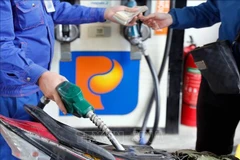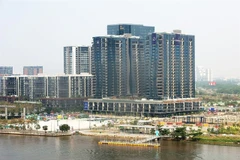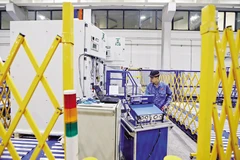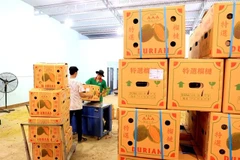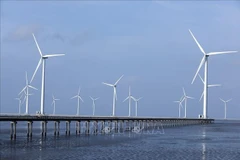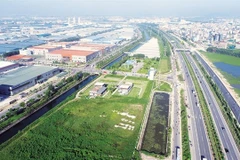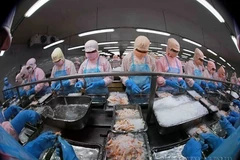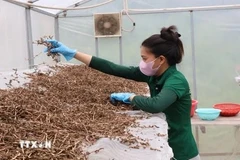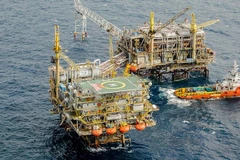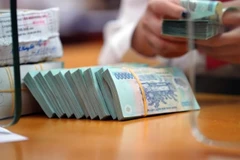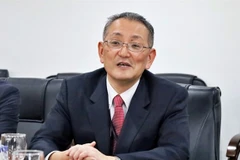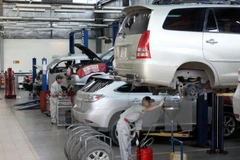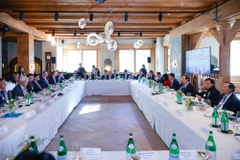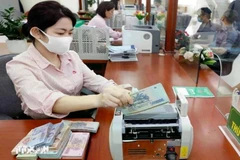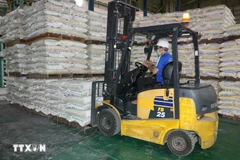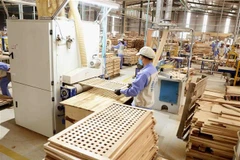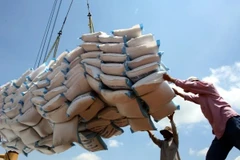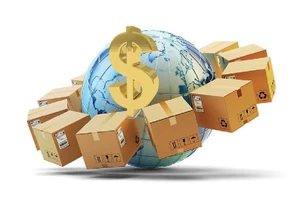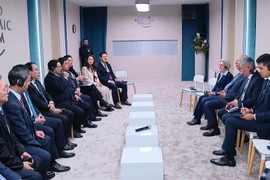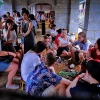 Workers produces footwear for export at the factory of the Phuc Yen Shoes Joint Stock Company in Vinh Phuc province (Photo: VNA)
Workers produces footwear for export at the factory of the Phuc Yen Shoes Joint Stock Company in Vinh Phuc province (Photo: VNA)
Tokyo (VNA) – Nikkei Asia, a news service of Japan, ran an article on November 9 saying that Vietnam is leading recovery in Southeast Asian supply chains.
It noted that as coronavirus cases fall dramatically across Southeast Asia, supply chains in the region are racing to recover to full strength after months of factory stoppages and production cuts.
It cited local media reports as saying that Vietnam in particular is seeing a rapid return to normality as Hanoi finally eases restrictions. About 200 factories in the country contracted to make sportswear for Nike have resumed operations.
An industrial park in Ho Chi Minh City that houses plants operated by Samsung Electronics and Intel will "provide assistance so that both companies' facilities will return to full production this month," said a park executive.
Starting in July, factories in the south of Vietnam were placed under heavy restrictions. The factories were also ordered to staff workers at around 30 - 50 percent of normal capacity at any time.
Vietnam's number of coronavirus cases gradually declined, with the daily infection rate currently at 7,000 people, considerably less than half of the late-August peak that topped 17,000 cases.
Companies that produce electrical and electronic components essential for the auto industry are also returning to full strength, much to the relief of manufacturers around the globe, according to Nikkei Asia.
Japan's Furukawa Electric expects to return to full capacity at its Vietnamese plants. Its three factories there make wire harnesses for automobiles, with the Ho Chi Minh City site alone staffed with about 8,000 workers.
The factory floors "have returned to a position where they can respond to requests from a client," said Furukawa Electric President Keiichi Kobayashi.
Since October, the utilisation rate at all three factories has been steadily recovering.
The impact from the COVID restrictions has been particularly damaging to Southeast Asia's automotive industry. Vietnam has a high concentration of wire harness factories, while Malaysia is a production hub for automotive semiconductors.
Both components had experienced shortages in supplies -- the main reason why Toyota Motor and seven other Japanese automakers were forced to cut September production in half compared to the previous year.
Vietnam was the source of about 40 percent of Japan's wire harness imports last year, and domestic suppliers Yazaki and Sumitomo Electric Industries are restoring production at their Vietnamese plants as well. This trend is expected to support a production comeback in Japan's auto sector.
Since the start of October, the country has considerably relaxed restrictions so that factories can gradually resume operations.
Meanwhile, the Wall Street Journal of the US cited Foxconn Technology Group, which supplies Apple, as saying that its facilities in Vietnam are operating normally.
One technician for a shoe factory in southern Vietnam said the factory was now operating with 4,000 of its 7,000 workers. It is expected to restore full production by November.
An employee of a large American apparel company said supplier factories in Vietnam already had around three-quarters of their workers back, the Wall Street Journal reports.
According to a survey conducted by the General Statistics Office of Vietnam for the fourth quarter, the percentage of firms recording increased revenue and recruiting more employees is much higher than those with declines in these regards.
The Purchasing Managers’ Index (MPI) in October rose to 52.1 points compared to the 40.2 points in September, which also reflects this positive trend./.




